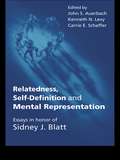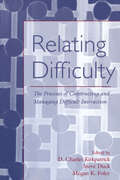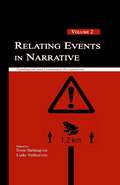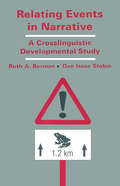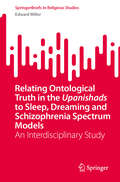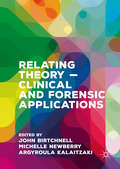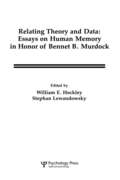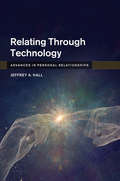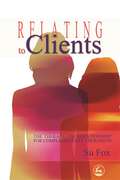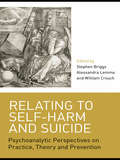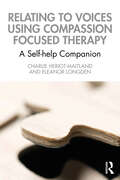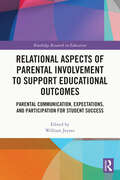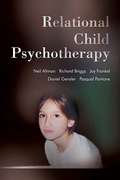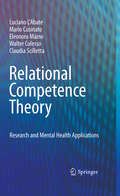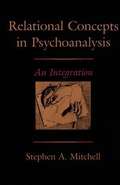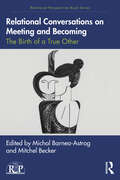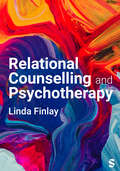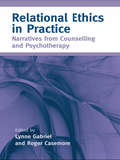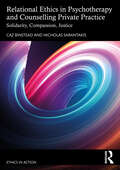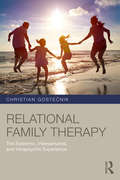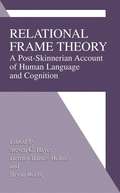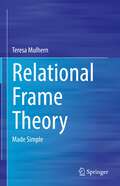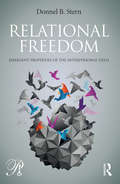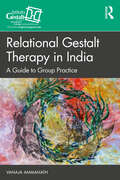- Table View
- List View
Relatedness, Self-Definition and Mental Representation: Essays in honor of Sidney J. Blatt
by Kenneth N. Levy John S. Auerbach Carrie E. SchafferOver the course of a long and distinguished career, psychologist and psychoanalyst Sidney J. Blatt has made major contributions to cognitive-developmental theory, psychoanalytic object relations theory, applied psychoanalysis, and current research in the areas of psychopathology and psychotherapy. This book presents chapters by Dr. Blatt's many colleagues and students who address the key areas in which Dr Blatt focuses his intellectual endeavours: *Personality development *Psychopathology *Issues in psychological testing and assessment *Psychotherapy and the treatment process *Applied psychoanalysis and broader cultural trendsRelatedness, Self-Definition and Mental Representation explores Dr. Blatt's unique contributions within both psychoanalysis, where empirical research is often neglected, and clinical psychology, where psychoanalysis is increasingly ignored. It will be engaging reading for psychoanalysts and clinical psychologists, as well as all those concerned with psychotherapy and personality theory and development.
Relating Difficulty: The Processes of Constructing and Managing Difficult Interaction (LEA's Series on Personal Relationships)
by Steve Duck D. Charles Kirkpatrick Megan K. FoleyRelating Difficulty offers insight into the nature of difficulty in relationships across a broad range of human experience. Whether dealing with in-laws or ex-spouses, long-distance relationships or power and status in the workplace, difficulty is an all too common feature of daily life. Relating Difficulty brings the academic understanding of relational processes to the everyday problems people face at home and at work. These essays represent a groundbreaking collection of the multidisciplinary conceptual and empirical work that currently exists on the topic. Along with issues such as chronic illness and money problems, contributors investigate contexts of relational difficulty ranging from everyday gossip, the workplace and shyness to more dangerous sexual “hookups” and partner abuse. Drawing on evidence presented in the volume, editors D. Charles Kirkpatrick, Steve Duck, and Megan K. Foley explain how relational problems do not emerge solely from individuals or even from the relationship itself. Instead, they arise from triangles of connection and negotiation between relational partners, contexts, and outsiders. The volume challenges the simple notion that relating difficulty is just about problems with "difficult people" and offers some genuinely novel insights into a familiar everyday experience. This exceptional volume is essential reading for practitioners, researchers and students of relationships across a wide range of disciplines as well as anyone wanting greater understanding of relational functioning in everyday life and at work.
Relating Events in Narrative, Volume 2: Typological and Contextual Perspectives
by Sven Strömqvist Ludo VerhovenRelating Events in Narrative, Volume 2: Typological and Contextual Perspectives edited by Sven Strömqvist and Ludo Verhoeven, is the much anticipated follow-up volume to Ruth Berman and Dan Slobin's successful "frog-story studies" book, Relating Events in Narrative: A Crosslinguistic Developmental Study (1994). Working closely with Ruth Berman and Dan Slobin, the new editors have brought together a wide range of scholars who, inspired by the 1994 book, have all used Mercer Mayer's Frog, Where Are You? as a basis for their research. The new book, which is divided into two parts, features a broad linguistic and cultural diversity. Contributions focusing on crosslinguistic perspectives make up the first part of the book. This part is concluded by Dan Slobin with an analysis and overview discussion of factors of linguistic typology in frog-story research. The second part offers a variety of theoretical and methodological perspectives, all dealing with contextual variation of narrative construction in a wide sense: variation across medium/modality (speech, writing, signing), genre variation (the specific frog story narrative compared to other genres), frog story narrations from the perspective of theory of mind, and from the perspective of bilingualism and second language acquisition. Several of the contributions to the new book manuscript also deal with developmental perspectives, but, in distinction to the 1994 book, that is not the only focused issue. The second part is initiated by Ruth Berman with an analysis of the role of context in developing narrative abilities. The new book represents a rich overview and illustration of recent advances in theoretical and methodological approaches to the crosslinguistic study of narrative discourse. A red thread throughout the book is that crosslinguistic variation is not merely a matter of variation in form, but also in content and aspects of cognition. A recurrent perspective on language and thought is that of Dan Slobin's theory of "thinking for speaking," an approach to cognitive consequences of linguistic diversity. The book ends with an epilogue by Herbert Clark, "Variations on a Ranarian Theme."
Relating Events in Narrative: A Crosslinguistic Developmental Study
by Dan Isaac Slobin Ruth A. BermanThis volume represents the culmination of an extensive research project that studied the development of linguistic form/function relations in narrative discourse. It is unique in the extent of data which it analyzes--more than 250 texts from children and adults speaking five different languages--and in its crosslinguistic, typological focus. It is the first book to address the issue of how the structural properties and rhetorical preferences of different native languages--English, German, Spanish, Hebrew, and Turkish--impinge on narrative abilities across different phases of development. The work of Berman and Slobin and their colleagues provides insight into the interplay between shared, possibly universal, patterns in the developing ability to create well-constructed, globally organized narratives among preschoolers from three years of age compared with school children and adults, contrasted against the impact of typological and rhetorical features of particular native languages on how speakers express these abilities in the process of "relating events in narrative." This volume also makes a special contribution to the field of language acquisition and development by providing detailed analyses of how linguistic forms come to be used in the service of narrative functions, such as the expression of temporal relations of simultaneity and retrospection, perspective-taking on events, and textual connectivity. To present this information, the authors prepared in-depth analyses of a wide range of linguistic systems, including tense-aspect marking, passive and middle voice, locative and directional predications, connectivity markers, null subjects, and relative clause constructions. In contrast to most work in the field of language acquisition, this book focuses on developments in the use of these early forms in extended discourse--beyond the initial phase of early language development. The book offers a pioneering approach to the interactions between form and function in the development and use of language, from a typological linguistic perspective. The study is based on a large crosslinguistic corpus of narratives, elicited from preschool, school-age, and adult subjects. All of the narratives were elicited by the same picture storybook,Frog, Where Are You?, by Mercer Mayer. (An appendix lists related studies using the same storybook in 50 languages.) The findings illuminate both universal and language-specific patterns of development, providing new insights into questions of language and thought.
Relating Ontological Truth in the Upanishads to Sleep, Dreaming and Schizophrenia Spectrum Models: An Interdisciplinary Study (SpringerBriefs in Religious Studies)
by Edward MillerThis book explores the potential relevance of the Upanishads, a corpus of ancient Eastern apophatic texts, to contemporary Western theories of consciousness and psychopathology, particularly in relation to psychoanalysis, neuroscience, and schizophrenia-spectrum disorders. Beginning with an analysis of Upanishadic thought and its historical influence in Europe, this work bridges the gap between ancient wisdom and modern scientific inquiry. It examines the dream theories of psychoanalyst Wilfred Bion in relation to Upanishadic conceptions of the Self, followed by an exploration of contemporary neuroscientific perspectives on selfhood. Further, it delves into the evolution and function of sleep and dreaming in Homo sapiens, proposing a novel heuristic: that schizophrenia-spectrum disorders may be developmentally linked to alterations in the sleep and dreaming systems of the human mind-brain. Offering a unique interdisciplinary synthesis, this text will appeal to scholars and students of philosophy, psychology, neuroscience, and religious studies, as well as those interested in the intersections of ancient meditative traditions and modern scientific paradigms.
Relating Theory - Clinical and Forensic Applications
by John Birtchnell Michelle Newberry Argyroula KalaitzakiThis book brings together recent research developments in relatingtheory. It is divided into four parts, which introduce the reader to relatingtheory, how it has developed and how it can be applied to clinical and forensicpsychology. Topics include how couples relate to one another, how young peoplerelate to their parents, how assessments of relating can be used in therapy,how specific negative relating styles relate to offending behaviour, risktaking and alcohol use, psychopathic and sadistic tendencies, and how theinterpersonal relating of offenders can change during treatment in prison. Thebook covers international research involving both quantitative and qualitativemethods, and will be of interest to clinicians, academics and bothundergraduate and postgraduate students in the fields of psychology, clinicalpsychology, forensic/criminal psychology, psychiatry, psychotherapy,counselling, art-therapy, and mental health.
Relating Theory and Data: Essays on Human Memory in Honor of Bennet B. Murdock
by Stephan Lewandowsky William E. HockleyThis festschrift represents the proceedings of a conference held in honor of Bennet B. Murdock, one of the foremost researchers and theoreticians on human memory and cognition. A highly renowned investigator respected for both his empirical and theoretical contributions to the field, Murdock summarized and focused a large amount of research activity with his 1974 book Human Memory: Theory and Data. This unique collection of articles addresses many of the issues discussed in his classic text. Divided into five principal sections, its coverage includes: theoretical perspectives on human memory ranging from a biological view to an exposition of the value of formal models; recent progress in the study of processes in immediate memory and recognition memory; and new developments in componential and distributed approaches to the modeling of human memory. Each section concludes with an integrative commentary provided by some of Murdock’s eminent colleagues from the University of Toronto. Thus, this book offers a diversity of perspectives on contemporary topics in the discipline, and will be of interest to students and scholars in all branches of cognitive science.
Relating Through Technology: Everyday Social Interaction (Advances in Personal Relationships)
by Jeffrey A. HallThis book answers one of the most critical questions of our time, does the vast connectivity afforded by mobile and social media lead to more personal connection with one another? It offers an evidence-based account of the role of technology in close relationships that confronts such pressing questions as where face-to-face communication belongs in this digital age, whether social media is harmful to our well-being, and how online communication spills-over into our offline communication and relationships. Each chapter explores the positive and negative influences of media on relationships, coalescing into a balanced assessment of how technological advancement has altered our connections with each other. By zeroing in on communication with the most important people in our lives and tracing the changes in computer-mediated communication over time, Relating Through Technology focuses the conversation about media on its use in our everyday lives and relationships.
Relating to Clients: The Therapeutic Relationship for Complementary Therapists
by Su FoxComplementary therapists are seldom trained in the 'people skills' necessary for working with their clients. This practical guide provides the key elements of the psychotherapeutic relationship for people working in non-verbal modalities. The book provides information and exercises to help practitioners improve their style of interacting with clients by setting clear boundaries, having a defined contract with them, communicating effectively and being a good listener, among other things. Drawn from experience both as a practitioner and as a client in a range of therapeutic contexts, Su Fox also uses illustrative case studies to offer strategies for managing 'difficult' clients and for working through the difficult feelings one may experience with other clients. The guidance in this book is indispensable for complementary therapy practitioners and students in the field, and is also of interest to anyone working with others in a 'helping' capacity.
Relating to Self-Harm and Suicide: Psychoanalytic Perspectives on Practice, Theory and Prevention
by Stephen BriggsAlessandra Lemma - Winner of the Levy-Goldfarb Award for Child Psychoanalysis! Relating to Self-Harm and Suicide presents original studies and research from contemporary psychoanalysts, therapists and academics focusing on the psychoanalytic understanding of suicide and self-harm, and how this can be applied to clinical work and policy. This powerful critique of current thinking suggests that suicide and self-harm must be understood as having meaning within interpersonal and intrapsychic relationships, offering a new and more hopeful dimension for prevention and recovery. Divided into three sections, the book includes: a theoretical overview examples of psychoanalytic practice with self-harming and suicidal patients applications of psychoanalytic thinking to suicide and self-harm prevention. Relating to Self-Harm and Suicide will be helpful to psychoanalytic therapists, analysts and mental health professionals wanting to integrate psychoanalytic ideas into their work with self-harmers and the suicidal. This text will also be of use to academics and professionals involved in suicidal prevention.
Relating to Voices using Compassion Focused Therapy: A Self-help Companion
by Charlie Heriot-Maitland Eleanor LongdenRelating to Voices helps people who hear voices to develop a more compassionate understanding and relationship with their voices. In this book, authors Charlie and Eleanor create a warm and caring tone for the reader and a respectful tone for their voices. With the help of regular ‘check-in boxes’, the book guides the reader towards an understanding of what voices are, what they may represent, and how we can learn to work with them in a way that leads to a more peaceful relationship. It offers a shift away from viewing voices as the enemies, towards viewing them as potential allies in emotional problem-solving. This approach may be different to some others that readers have come across, which can often be about challenging voices, suppressing them, distracting from them, or getting rid of them. The Compassion Focused Therapy (CFT) approach suggests that we can learn to relate to both voices and ourselves in a way that is less about conflict and more about cooperation. This book will be a useful companion for voice-hearers as well as for their supporters and allies in their journey of self-help. It will also be of use to mental health and social service workers.
Relational Aspects of Parental Involvement to Support Educational Outcomes: Parental Communication, Expectations, and Participation for Student Success (Routledge Research in Education)
by William JeynesOffering contributions from international leaders in the field, this volume builds on empirically informed meta-analyses to foreground relationship-based aspects of parental involvement in children’s education and learning. Chapters explore how factors including parent-child communication, cultural and parental expectations, as well as communication with a child’s teacher and school can impact educational outcomes. By focusing on relationships between parents, teachers, and students, chapter authors offer a nuanced picture of parental involvement in children’s education and learning. Considering variation across countries, educational and non-educational contexts, and challenges posed by parental absence and home schooling, the book offers key insights into how parents, schools, communities, and educators can best support future generations. Using multiple forms of research from the relational perspective, this volume will be of interest to students, scholars, and researchers with an interest in educational psychology as well as child development.
Relational Child Psychotherapy
by Neil Altman Richard Briggs Jay Frankel Daniel Gensler Pasqual PantoneThe authors, all affiliated with the William Alanson White Institute in New York City, intend this work as a comprehensive introduction to the experience of working in relational psychotherapy with children and parents. They review the theories of development that underlie their work and develop it into a theory of psychopathology in childhood. They then turn their attentions to the process of psychotherapy, presenting chapters and assessment, treatment planning, the use of play, transference and countertransference, interaction, parental inclusion, and therapeutic action. Annotation (c)2003 Book News, Inc. , Portland, OR (booknews. com)
Relational Competence Theory
by Luciano L'Abate Claudia Scilletta Mario Cusinato Walter Colesso Eleonora MainoRelational competence--the set of traits that allow people to interact with each other effectively--enjoys a long history of being recorded, studied, and analyzed. Accordingly, Relational Competence Theory (RCT) complements theories that treat individuals' personality and functioning individually by placing the individual into full family and social context. The ambitious volume Relational Competence Theory: Research and Mental Health Applications opens out the RCT literature with emphasis on its applicability to interventions, and updates the state of research on RCT, examining what is robust and verifiable both in the lab and the clinic. The authors begin with the conceptual and empirical bases for the theory, and sixteen models demonstrate the range of RCT concerns and their clinical relevance, including: - Socialization settings for relational competence. - The ability to control and regulate the self. - Relationship styles. - Intimacy and negotiation. - The use of practice exercises in prevention and treatment of pathology. - Appendices featuring the Relational Answers Questionnaire and other helpful tools. Relational Competence Theory both challenges and confirms much of what we know about the range of human relationships, and is important reading for researchers, scholars, and students in personality and social psychology, psychotherapy, and couple and family counseling.
Relational Concepts in Psychoanalysis: An Integration
by Stephen A. MitchellIn this book the author applies the relational perspective to several areas of clinical concern, including sexuality, childhood development, narcissism, and theories of change and healing.
Relational Conversations on Meeting and Becoming: The Birth of a True Other (Relational Perspectives Book Series)
by Michal Barnea-Astrog Mitchel BeckerDemonstrating a relational, dialogic way of thinking and writing, this book offers an innovative perspective on the human potential for intersubjective engagement and on the nature of true encounter. The authors engage in creative, associative dialogues and trialogues inspired by psychoanalysis and Buddhism, poetry and religion, theory and case studies, academic and free styles of writing – each enriching the other. Reflecting on the essence of relating, they convey a flow between inner, private reveries and shared ones, and between individual expressions of thought and evolvements of newly born thirds. Through this interdisciplinary, experimental setting, the authors explore the possibility to reach truths and meanings that each individual would not have achieved on their own. Offering new concepts and formulations that may nourish psychotherapists’ thought and be usefully implemented in their practice, this book presents a pressingly unique and essential viewpoint for psychoanalysts and psychoanalytic psychotherapists in training and in practice.
Relational Counselling and Psychotherapy
by Linda FinlayThis book is your essential introduction to relational counselling and psychotherapy. It maps out relational concepts and approaches by drawing on humanistic, psychodynamic, cognitive-behavioural and systemic modalities, using case material to demonstrate different ways of being a relational practitioner. The book shows you how to use relationally orientated skills, competencies, interventions and practices across the therapy process from beginning – middle – end. Content on the social context, on issues of power, diversity and difference, support your personal and professional development. Supported by case studies, recent research and a wealth of learning features, this book will support your development as a relational therapist
Relational Counselling and Psychotherapy
by Linda FinlayThis book is your essential introduction to relational counselling and psychotherapy. It maps out relational concepts and approaches by drawing on humanistic, psychodynamic, cognitive-behavioural and systemic modalities, using case material to demonstrate different ways of being a relational practitioner. The book shows you how to use relationally orientated skills, competencies, interventions and practices across the therapy process from beginning – middle – end. Content on the social context, on issues of power, diversity and difference, support your personal and professional development. Supported by case studies, recent research and a wealth of learning features, this book will support your development as a relational therapist
Relational Ethics in Practice: Narratives from Counselling and Psychotherapy
by Roger Casemore Lynne GabrielRelational Ethics in Practice presents a new collection of narratives on ethics in day-to-day therapeutic practice. Highly experienced professionals from a range of roles in the therapeutic professions explore ways of developing ethical and effective relationships. The contributors provide the reader with engaging and informative narratives that indicate how ethics can inform and influence practice in a variety of clinical contexts across the helping professions. These personal and professional narratives will encourage people to think more proactively about ethics and the impact that they have on both therapeutic practice, and life in general. Throughout this book, Lynne Gabriel, Roger Casemore and their contributors emphasise that the consideration of the ethical dimension is of paramount importance to successful processes and outcomes in every therapeutic relationship. Chapters cover a number of topics including: how theoretical approaches can inform ethical decision making and practice practical difficulties and ethical challenges innovative and unconventional approaches informed consent across various contexts pointers for good practice the notion of the 'wounded healer'. Relational Ethics in Practice: Narratives from Counselling and Psychotherapy will appeal to a wide range of readers involved in the helping professions including counsellors, psychotherapists, researchers, supervisors and trainees.
Relational Ethics in Psychotherapy and Counselling Private Practice: Solidarity, Compassion, Justice (Ethics In Action)
by Caz Binstead Nicholas SarantakisThis book explores the ethics around everything connected with setting up and running a therapy private practice.Offering a hands-on approach to realistic ethical dilemmas encountered by the private practitioner, the book examines the everyday management of practice, and the context of ethical issues in contemporary private practice. Chapters explore the fundamentals of some of the most common ethical considerations in private practice, providing space for the reader to think creatively about how they use their preferred ethical framework, and how that may be translated into an individually tailored approach for each client, and for each private practice. The book provides exercises, examples, and vignettes, in addition to the author’s own unique working model, to help the reader bring theoretical reflections into their own everyday practice.Relational Ethics in Psychotherapy and Counselling Private Practice will help private practitioners feel more confident and grounded in their private practice and up-to-date with developing thoughts. It will also appeal to training institutes, supervisors, and students.
Relational Family Therapy: The Systemic, Interpersonal, and Intrapsychic Experience
by Christian GostečnikRelational Family Therapy introduces a cutting-edge family and couple therapy model that synthesizes relational theories and integrates object relations theory with interpersonal psychoanalysis and self-psychology. The model holds that individuals deal with conflicts rooted in the frustrated and threatening environment they grew up in by later forming intimate relationships that are comparable to the core experiences from their primary family systems. The book outlines the three levels of experience—systemic, interpersonal, and intrapsychic—and provide concrete ways for the therapist to address client problems and promote affect regulation. Chapters include transcripts of actual family therapy sessions as well as genograms so readers can see the model in action.
Relational Frame Theory: A Post-Skinnerian Account of Human Language and Cognition
by Dermot Barnes-Holmes Steven C. Hayes Bryan RocheRFT is a post-Skinnerian account of human language and cognition. It provides the theoretical basis of the contextualism in behavioral and cognitive approaches to human learning and psychological and emotional growth.
Relational Frame Theory: Made Simple
by Teresa MulhernRelational Frame Theory: What is it? Why is it important? How can I use it? This book dispels the confusion surrounding Relational Frame Theory and provides an easy-to-understand briefing of Relational Frame Theory and its’ components, with examples to enhance and ease understanding. Recent research has indicated that Relational Frame Theory may form the cornerstone of language and intelligence and this textbook integrates this information into an easily digestible format, considering the importance of each relational frame from coordination to analogy. Relational Frame Theory provides a potentially useful framework for teaching language and academic skills and the current textbook provides some examples of how to do this and offers some considerations for future research in this area. This book makes Relational Frame Theory easy to understand and, unlike previous books, assumes no prior knowledge of the theory amongst readers and clarifies some of the jargon used within this body of work. This book provides the most up-to-date outline of previous work within Relational Frame Theory and gives an overview of how this theory could be applied within psychology. To date, no previous book has attempted to integrate research, application and an easy-to-understand overview of the theory together – this book aims to integrate all of these aspects into one easily comprehensible guide. The current textbook is aimed towards graduate students and practitioners of applied behavior analysis. Given the proposed changes to the Behavior Analysis Certification Board which will focus more on Relational Frame Theory than in the past, a book of this nature will be helpful for those pursuing certification and may also be helpful for use within the applied field.
Relational Freedom: Emergent Properties of the Interpersonal Field (Psychoanalysis in a New Key Book Series)
by Donnel B. SternRelational Freedom: Emergent Properties of the Interpersonal Field addresses the interpersonal field in clinical psychoanalysis and psychotherapy, especially the emergent qualities of the field. The book builds on the foundation of unformulated experience, dissociation, and enactment defined and explored in Stern’s previous, widely read books. Stern never considers the analyst or the patient alone; all clinical events take place between them and involve them both. Their conscious and unconscious conduct and experience are the field’s substance. We can say that the changing nature of the field determines the experience that patient and analyst can create in one another’s presence; but we can also say that the therapeutic dyad, simply by doing their work together, ceaselessly configures and reconfigures the field. "Relational freedom" is Stern’s own interpersonal and relational conception of the field, which he compares, along with other varieties of interpersonal/relational field theory, to the work of Bionian field theorists such as Madeleine and Willy Baranger, and Antonino Ferro. Other chapters concern the role of the field in accessing the frozen experience of trauma, in creating theories of therapeutic technique, evaluating quantitative psychotherapy research, evaluating the utility of the concept of unconscious phantasy, treating the hard-to-engage patient, and in devising the ideal psychoanalytic institute. Relational Freedom is a clear, authoritative, and impassioned statement of the current state of interpersonal and relational psychoanalytic theory and clinical thinking. It will interest anyone who wants to stay up to date with current developments in American psychoanalysis, and for those newer to the field it will serve as an introduction to many of the important questions in contemporary psychoanalysis. Psychoanalysts and psychotherapists of all kinds will profit from the book’s thoughtful discussions of clinical problems and quandaries. Donnel B. Stern, Ph.D.., a psychoanalyst and psychotherapist in private practice in New York City, serves as Training and Supervising Analyst at the William Alanson White Institute, and Adjunct Clinical Professor and Consultant at the NYU Postodoctoral Program in Psychotherapy and Psychoanalysis. He is the founder and editor of "Psychoanalysis in a New Key," a book series published by Routledge.
Relational Gestalt Therapy in India: A Guide to Group Practice (Gestalt Therapy Book Series)
by Vanaja AmmanathThis fascinating book examines the place and practice of Relational Gestalt therapy (RGT) within an Indian cultural context, and how it can be applied in a group setting. The book begins by introducing the foundational concepts of Gestalt therapy (GT), namely phenomenology, field theory and dialogic existentialism. Through stories and vignettes, it then invites the reader to enter the circle of the group, a profound way of learning akin to the old Indian folk tradition of village communities sharing stories and bonding as a social group. Drawing from these narratives, the book not only elaborates on the theoretical concepts of GT, but also offers culturally sensitive guidance for Indian practitioners wishing to conduct group therapy. Written by a practitioner with over 20 years’ experience, this book will prove essential reading not only for practitioners working in India, but also for anyone with an interest in how GT can be applied in group settings in different cultural contexts.
